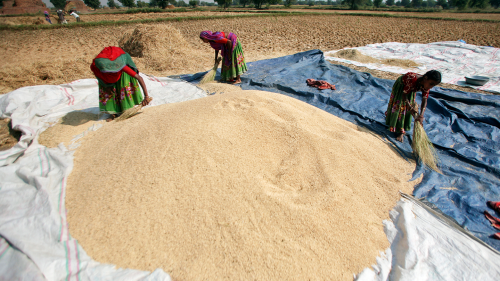Taliban Assets, Maize Malaise, and Broken Rice
Check out our roundup of the week's top news and research in food, agriculture, and global development.

Top Story
India's Rice Restrictions
India is restricting exports of broken rice amid concerns of lower rice production during its uneven monsoon season. The government has also imposed a 20 percent tax on exports of husked brown rice and semi- or wholly-milled white rice. As the world’s second largest rice supplier, India’s restrictions exacerbate existing food shortages caused by the war in Ukraine and droughts in other rice-exporting countries.
Council Insights
Maize Malaise
Fluctuating maize prices in low-income countries’ rural markets disincentivize smallholder farmers from selling their grain at an optimal time, according to Nonresident Fellow Hope Michelson in her recent journal article. Michelson argues that aversion to negative returns contributes to farmers’ decisions to opt out of storage at harvest, which could otherwise improve maize returns. Read the full journal article now.
Food & Agriculture
Fighting Regulation
The Sustainable Use of Pesticides regulation is facing pushback among EU countries. Asking for exceptions to the regulation, EU countries are expected to delay its passing, which would reduce pesticide use in the EU 50 percent by 2030. However, the reductions could potentially reduce agricultural output at a time when food prices are already heavily inflated.
Taliban Assets
The Biden administration announced that $3.5 billion in Afghanistan’s Central Bank will be unfrozen to ease the country’s economic crisis. The fund, which is held in Switzerland, will be run by Swiss government officials and Afghan economists in order to prevent the assets from being funneled into the Taliban. Although this was the initial justification for freezing roughly $7 billion in assets, critics of the move claim that it spurred Afghanistan’s rapid economic collapse and current hunger crisis. It is estimated that roughly 90% of Afghan citizens are facing food insecurity.
Sudan’s Hunger Crisis
South Sudan is facing one of the world’s most severe hunger crises, with approximately 63 percent of its population experiencing acute food insecurity. Caused by the effects of COVID-19, climate shocks, and conflict, the nation’s food crisis is hitting girls and women especially hard, putting them at higher risk of no education, early and forced marriage, gender-based violence, and sexual exploitation. Read our 2019 report Girls Leading: From Rural Economies to Global Solutions to learn more about the agricultural needs of girls, and solutions to the challenges they face.
Deeper Dive
What Is Broken Rice?
Broken rice is fragmented rice grains broken in the field, or during drying, transport, or milling. Despite being fragmented, broken rice is not defective and is still suitable for eating. Sold at a cheaper rate, broken ice is more accessible for low-income families.
Data Crunch
Economic Downturn
Fertilizer and fuel shortages triggered economic downturns in Sri Lanka, accounting for an 8.4 percent decline in the economy during the most recent quarter. The agriculture industry also shrank by 8.4 percent and industries by 10 percent, while services dropped 2.2 percent. Coupled with an acute dollar shortage, residents are struggling to pay for essential imports such as food and fertilizer, and can expect continuing economic declines in the near future.
Resilience
Get Growing
Soaring food prices are prompting residents across major cities in Brazil to turn to urban farming. Currently, 33 million people are food insecure in Brazil, compared to 19 million at the end of 2020. The government is encouraging people to use urban gardens through a $100 monthly stipend to purchase resources, such as seeds and tools necessary to farm strips of land in the poorest neighborhoods.
Big Ideas
Beetle Feed
A new biotech start-up hopes to make the food supply chain in the Middle East and Africa more equitable and sustainable by using a new kind of animal feed: beetles. Targeting khepra beetles, one of the most destructive pests of grain products and seeds, the start-up hopes to protect crops from pests while simultaneously reducing the environmental burden of livestock farming.
DC Report
Finding Food Funding
The USDA announced nearly $2 billion in funding for food banks and school meal programs to purchase American-grown foods. The money will go towards emergency food providers, school lunch and breakfast programs, and expanding the Local Food Purchase Assistance program. With more than ten percent of American households reportedly food insecure in 2021, the funding is paramount to fighting hunger and supporting nutrition ahead of the 2022 White House Conference on Hunger, Nutrition, and Health. Check out our recommendations for new policies and actions in our task force report.
Big Actors
China’s Farmland Purchases - Opinion
Chinese ownership of US farmland has grown over 20 times what it was just ten years ago. Under the Agricultural Foreign Investment Disclosure Act, all foreign purchases must be reported to the USDA, but the documentation process has been poorly maintained and is fraught with errors. Not all of the land is dedicated to farming, however, as is the case in Val Verde County, Texas, where a Chinese billionaire invested $110 million to build a 15,000-acre wind turbine farm.
Trade & Commodities
Cutting Forced Labor
The EU plans to ban all goods that are the product of forced labor, putting specific emphasis on the agriculture industry. Seen as targeting exports from Xinjiang, a region in China suspected of forcing ethnic Uyghurs to work in camps, the policy could increase regional trade tensions, but loose enforcement policies may prevent it from having a substantial impact on agricultural goods.
Council Events
Did you miss one of our previous livestreams? Don't worry! They are all available on our website to watch at any time.
Other Upcoming Events
2022 Africa Agriculture Trade Monitor
Date: September 27
Time: 9:30 – 11:15 a.m. ET
Food Waste: Access, Affordability, and Acceptability
Date: September 29
Time: 4:00 – 5:30 p.m. ET
New Farmer U
Date: October 28 - 29
Land Acknowledgement Statement
The Center on Global Food and Agriculture recognizes it occupies the ancestral land of the Kiikaapoi, Peoria, Kaskaskia, Bodwéwadmi, and Myaamia people. Indigenous communities around the world disproportionately experience the pressures of climate change, global conflicts, and the COVID-19 pandemic, while simultaneously stewarding 80 percent of the world’s biodiversity. These Indigenous tribes and nations are the original owners of this land and continue to be systemically erased by policies and practices that ignore their histories. To learn more about Indigenous foodways and practices, check out our 2022 blog series "Stewardship, Sovereignty, and Solutions."
Related Content
- Embracing Dandelions as Food and Medicine
- Going Beyond Regenerative Agriculture on Tribal Lands
- Expanding "638" to Enhance Native American Food Sovereignty
- Flavors and Culture: Food Systems Through Indigenous Women's Eyes
- A Thanksgiving Legacy: Fighting for Indigenous Food Sovereignty
- Native Food Sovereignty: Strengthening Connection to Culture
- Reconnecting to Indigenous Food Sovereignty Values and Practices
- Embracing Interconnectedness: How Indigenous Foodways Can Save Us


